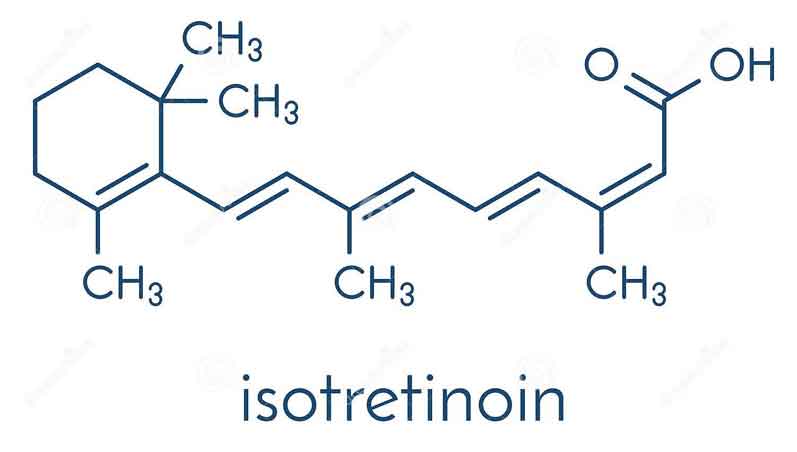What is isotretinoin? - Dr Yeung Ho Hong 楊浩康

Mechanisms of isotretinoin action
Isotretinoin (異維A酸) is a medication belonging to the retinoid class (vitamin A analogs), primarily used to treat severe or persistent acne. This drug can be administered through topical application or oral intake, but this article will focus on the effects and mechanisms of oral isotretinoin. Oral isotretinoin is highly effective for treating acne that does not respond to conventional methods, such as cystic acne (囊腫型暗瘡, acne cystica) or nodular acne (結節型暗瘡). It excels in reducing inflammation, regulating sebum production, and promoting normal keratinization of hair follicles.
Treatment options for oral isotretinoin
The mechanism of action of oral isotretinoin is primarily reflected in several key aspects: First, it inhibits follicular keratinization, which helps prevent the excessive accumulation of keratinized cells, thereby reducing the formation of comedones or blackheads. Second, it reduces sebaceous gland activity, leading to decreased sebum production, which is crucial for controlling acne development. Additionally, oral isotretinoin inhibits the proliferation of *Propionibacterium acnes* (痤瘡桿菌), while also diminishing inflammatory responses in the follicular area. Together, these effects alleviate acne symptoms.
Cautions on the use of isotretinoin
To achieve optimal results, acne patients must adhere to a complete treatment regimen. Numerous clinical studies indicate that patients should begin oral isotretinoin therapy under a physician’s evaluation and supervision. The American Academy of Dermatology (AAD) recommended in 2016 that the cumulative total dose of oral isotretinoin should range between 120 mg/kg and 150 mg/kg, a dosage critical for preventing acne recurrence. While most patients experience significant improvement after completing the full course, approximately one-third may experience acne relapse afterward, requiring further treatment.
During the treatment process, despite its clear therapeutic benefits, oral isotretinoin may also cause a range of side effects. Common side effects include dryness of the skin and mucous membranes, chapped lips, dry eyes, and occasionally hair loss, joint pain, or mood swings. Since these side effects can impact a patient’s quality of life, doctors typically conduct a comprehensive health assessment and necessary blood tests before starting the therapy to ensure liver function, blood lipids, and other indicators remain within normal ranges.
Moreover, special caution is required for pregnant women or those planning pregnancy when using oral isotretinoin. Isotretinoin has significant teratogenic effects, necessitating effective contraceptive measures before, during, and after treatment. Typically, patients are required to avoid pregnancy for one month before starting treatment, throughout the treatment period, and for one month after its completion. This is one reason why physicians rigorously inquire about a patient’s gynecological history and pregnancy status before prescribing oral isotretinoin.
Beyond individual differences, the effectiveness of oral isotretinoin also closely depends on a patient’s tolerance and adherence to the medication. Patients undergoing treatment should follow medical advice and attend regular follow-ups, allowing physicians to adjust the dosage based on treatment progress and side effects. Although some patients may experience a temporary “acne flare-up” (爆痘期) during the initial phase of treatment—where symptoms briefly worsen—most symptoms gradually improve as drug levels stabilize, ultimately leading to lasting skin improvement.
Overall, isotretinoin , as a potent acne treatment drug, is widely used clinically for managing refractory acne. By regulating follicular keratinization, reducing sebum production, and inhibiting *Propionibacterium acnes* proliferation, it helps patients fundamentally improve their skin condition. However, due to its side effects and specific contraindications, its use must be closely monitored by a professional physician. Before starting treatment, patients should fully understand the treatment mechanism, potential side effects, and necessary precautions, strictly adhering to medical advice to ensure both efficacy and safety.
For patients with severe acne or those unresponsive to traditional treatments, oral isotretinoin undoubtedly offers an effective therapeutic option. Even though some patients face a risk of relapse after completing the course, ongoing monitoring and timely adjustments to the treatment plan can typically achieve long-term symptom control and significant skin improvement. With further advancements in medical technology, future guidelines for the use of isotretinoin and the management of its side effects are expected to become more refined, providing patients with safer and more optimized treatment services.
